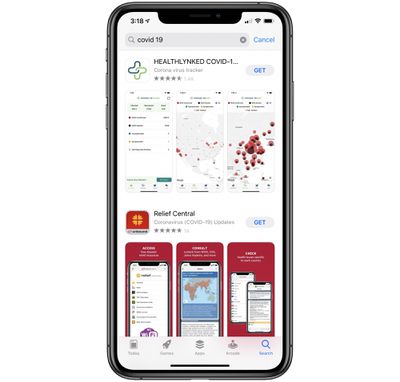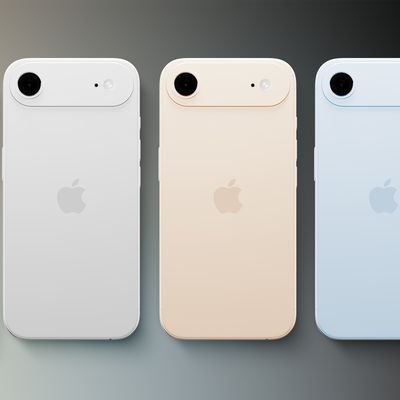Apple Rejecting Coronavirus Apps Not From Health or Government Organizations
Apple is rejecting apps that are related to the COVID-19 coronavirus that aren't provided by health organizations or government institutions, according to CNBC

Four independent developers that spoke to CNBC said that their coronavirus apps, which were designed to let people see stats about which countries have confirmed cases, had been rejected.
One developer was told over the phone by an Apple employee that anything related to the coronavirus needs to be released by an official health organization or government, while another received a notice that "apps with information about current medical information need to be submitted by a recognized institution."
Apple has been evaluating and rejecting coronavirus apps to prevent the spread of misinformation, looking at where the health data is sourced from and whether developers represent organizations that users can trust to publish accurate data.
Searches for coronavirus and COVID-19 on the App Store bring up few results, including a COVID-19 virus tracker from Healthlynked that uses World Health Organization data, the Epoch Times, and an app from the Brazilian government.
Other tech companies have taken similar steps to prevent the spread of misinformation. Facebook and Twitter have banned misleading coronavirus-related ads, and Amazon has banned coronavirus products and sellers attempting to price gouge on items like face masks and hand sanitizer.
Google also has a policy against apps that capitalize on a natural disaster or profit from a tragic event and there are no apps related to the coronavirus available from Google Play in the United States.
Popular Stories
Apple will launch its new iPhone 17 series in two months, and the iPhone 17 Pro models are expected to get a new design for the rear casing and the camera area. But more significant changes to the lineup are not expected until next year, when the iPhone 18 models arrive.
If you're thinking of trading in your iPhone for this year's latest, consider the following features rumored to be coming...
A new Apple TV is expected to be released later this year, and a handful of new features and changes have been rumored for the device.
Below, we recap what to expect from the next Apple TV, according to rumors.
Rumors
Faster Wi-Fi Support
The next Apple TV will be equipped with Apple's own combined Wi-Fi and Bluetooth chip, according to Bloomberg's Mark Gurman. He said the chip supports ...
Apple's next-generation iPhone 17 Pro and iPhone 17 Pro Max are only two months away, and there are plenty of rumors about the devices.
Below, we recap key changes rumored for the iPhone 17 Pro models.
Latest Rumors
These rumors surfaced in June and July:A redesigned Dynamic Island: It has been rumored that all iPhone 17 models will have a redesigned Dynamic Island interface — it might ...
Apple does not plan to refresh any Macs with updated M5 chips in 2025, according to Bloomberg's Mark Gurman. Updated MacBook Air and MacBook Pro models are now planned for the first half of 2026.
Gurman previously said that Apple would debut the M5 MacBook Pro models in late 2025, but his newest report suggests that Apple is "considering" pushing them back to 2026. Apple is now said to be...
iPhone 17 Pro and iPhone 17 Pro Max models with displays made by BOE will be sold exclusively in China, according to a new report.
Last week, it emerged that Chinese display manufacturer BOE was aggressively ramping up its OLED production capacity for future iPhone models as part of a plan to recapture a major role in Apple's supply chain.
Now, tech news aggregator Jukan Choi reports...
The long wait for an Apple Watch Ultra 3 is nearly over, and a handful of new features and changes have been rumored for the device.
Below, we recap what to expect from the Apple Watch Ultra 3:Satellite connectivity for sending and receiving text messages when Wi-Fi and cellular coverage is unavailable
5G support, up from LTE on the Apple Watch Ultra 2
Likely a wide-angle OLED display that ...
In select U.S. states, residents can add their driver's license or state ID to the Wallet app on the iPhone and Apple Watch, providing a convenient and contactless way to display proof of identity or age at select airports and businesses, and in select apps.
Unfortunately, this feature continues to roll out very slowly since it was announced in 2021, with only nine U.S. states, Puerto Rico,...
The iPhone 17 and iPhone 17 Air will be available in a total of nine color options, according to new information coming out of Asia.
The iPhone 17 Air's expected color options.
According to the leaker going by the account name "yeux1122" on the Korean blog Naver, accessory manufacturers are now producing camera protector rings for the iPhone 17 and iPhone 17 Air in colors to match their...





















